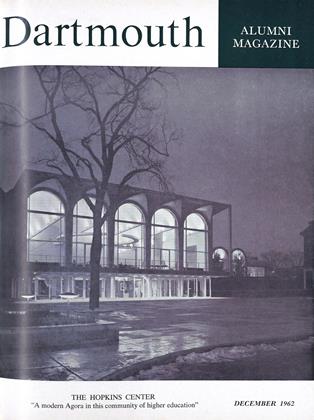(Prof. John Finch of the English Departmentreviewed the opening play in HopkinsCenter for the Valley News. The followingis taken from Prof. Finch's review.)
"To open its superb new theatre the directors of Hopkins Center have chosen a massive play, 'Danton's Death,' the work of a young trail-blazer of the European theatre, Georg Buechner, who wrote his masterpiece in 1835 at the age of 22 and died two years later. It is a daring choice, for the play is a challenge to its producers, its actors, and its audience. Rather than settling for the easy effectiveness of a familiar stand-by or a warmed-over commercial hit, the Hopkins Center staff has elected to stretch and strive. . . .
"Much was propitious about the opening. The theatre itself is startlingly beautiful and wonderfully equipped. The audience came desirous of a play that would match in its dimensions the dimensions of its surroundings. Further, Dartmouth is lucky in that it has this year a whole generation of young actors of unusual talent and dedication. And James H. Clancy, the nationally known director newly added to the Hopkins Center staff, has used many of them in this production. The result is a collector's item for theatre goers and an experience that will long re-echo in the memory of its audience. . . .
"The play presents the final blooddrenched days of the Terror of 1794, throws before us a gallery of sharply drawn portraits of the French revolutionists, and broods with them on the paradoxes of liberty, the pitfalls of equality, and the bitter fraternity of the tumbril. The play's pace is uneven. It surges up to passionate and ringing climaxes, and drops to somber interludes of meditation; it is by turn brutal and tender, shockingly harsh and purely eloquent. Always, and this is one of its many fascinations, it speaks with surprising relevance to the twentieth century. One is reminded in dramatic terms, of the epic theatre of Brecht or, as the condemned citizens wait for the guillotine, of those more recent waiters for Godot; and the ideas that swirl upon the stage might often have been called up by the new terrors of armed totalitarianism rather than the earlier terrors of the Revolution....
"It is a play to contemplate with the mind. It is not escapist entertainment and it offers no excursions from responsibility. This is, instead, stern theatre. Its bitter tang is tonic, and it demonstrates again what a demanding and exhilarating place a stage can be."
Article
-
 Article
ArticleTHE NEW HOME OF THE NON-ATHLETIC ORGANIZATIONS
May, 1914 -
 Article
ArticleNOTES
August, 1923 -
 Article
ArticleThe Moosilauke Ravine Lodge?
JUNE 1959 -
 Article
ArticleMasthead
July/August 2006 -
 Article
Article1931
May 1939 By CHARLES S. MCALLISTER -
 Article
ArticleFriends of Baker Library at Dartmouth
April 1938 By Herbert F. West '22.








